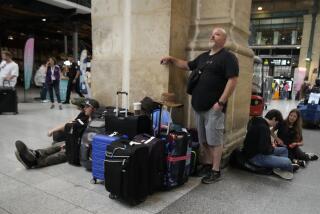India decries ‘an act of sabotage’
- Share via
DEWANA, INDIA — With a name meaning understanding and agreement, the Samjhauta Express linking India and Pakistan was a symbol of hope that the two nations might finally trade decades of enmity for friendship.
That ideal of cooperation seems to have been a target in the firebomb attack that killed scores of passengers trapped in two of the train’s burning carriages as it sped toward the Pakistani border.
The blaze was sparked by a pair of crude incendiary devices, prompting speculation that the disaster was the work of attackers bent on crippling India and Pakistan’s halting steps toward peace, including a high-level meeting set for today between the nuclear-armed archrivals.
“This is an act of sabotage,” India’s railway minister, Laloo Prasad Yadav, told reporters Monday. “This is an attempt to derail the improving relationship between India and Pakistan.”
Diplomacy between New Delhi and Islamabad seemed to remain on course, with the expected arrival in the Indian capital today of Pakistani Foreign Minister Mian Khursheed Mehmood Kasuri for the previously scheduled talks.
“We will not allow elements which want to sabotage the ongoing peace process to succeed in their nefarious designs,” Pakistani state media quoted Pakistani President Pervez Musharraf as saying.
Shivraj Patil, India’s home minister, told reporters that police had collected enough clues to point to a possible culprit, but that the information was being withheld so it would not “be misused.” Five years ago this month, a deadly fire aboard a train in Gujarat state -- a blaze widely, but wrongly, blamed on Muslim arsonists -- ignited religious riots that left more than 1,000 people dead.
This morning, police released sketches of two men who apparently jumped off the Samjhauta Express shortly before the firebombs went off close to midnight Sunday.
Indian media reported Monday that two suitcases with undetonated firebombs had been found; television footage showed at least one of the cases being blown up in a controlled explosion in a field near the village of Dewana, about 50 miles north of New Delhi.
The devices, packed with bottles of flammable liquid, were designed more to start fires than to kill by impact, an official from India’s Home Ministry told CNN-IBN television.
By midmorning Monday, the charred remains of at least 67 people, some of them children, had been pulled from the two burned-out coaches, which sat near Dewana, surrounded by dark green wheat fields.
*
Searching for his sister
Most of the victims were Pakistanis, officials said. Relatives from the Indian side of the border milled about in grief at the site of the fire and outside the small hospital in the nearby town of Panipat, where blocks of ice were being hauled in to cool a morgue filled to overflowing.
“Never did we dream something like this would happen,” said Fakhruddin Behlim, a resident of the Indian state of Rajasthan, whose 72-year-old sister was aboard one of the burned carriages.
In vain, Behlim scanned the short list of injured for his sister’s name. What awaited him next was a grim pile of scorched belongings -- passports, clothes -- that police had culled to help family members identify the dead, some of whom were burned beyond recognition.
The blaze came just seven months after a series of synchronized bomb blasts on commuter trains in the bustling financial capital of Mumbai, which killed about 200 people.
Investigators were quick to accuse Lashkar-e-Taiba, a Kashmiri militant group, of orchestrating that earlier attack, possibly in league with Pakistan’s intelligence service. In protest, the Indian government canceled meetings with Pakistani officials, which were later revived.
This time, authorities say they are not ruling out any of the terrorist groups that operate in India, from Muslim radicals to Hindu extremists, who are potentially unhappy over the attempts at rapprochement between Islamabad and New Delhi.
The attack added a new item to today’s talks in New Delhi, and could further complicate a controversial agreement by the two sides to share anti-terrorist intelligence, which is due for its first trial at a meeting in Islamabad early next month.
If Indian authorities conclude that disgruntled Pakistanis had a direct or indirect hand in the latest attack, pressure from opponents of the agreement could force the government here to revisit the issue.
Perhaps to forestall such an outcome, Tasnim Aslam, a spokeswoman for the Pakistani Foreign Ministry, emphasized India’s responsibility to secure its trains, which form one of the world’s biggest rail networks.
“Most of the victims who died in the incident were Pakistanis,” Aslam said. “India should hold an inquiry and punish the perpetrators.”
Survivors and relatives of the dead faulted what they described as lax security that allowed suitcases packed with fuel onto several coaches. In the crowded lower-class coaches of the Samjhauta Express, passengers were trapped by security bars over the train’s windows.
At the Panipat Civil Hospital, Qamaruddin Rajput lay propped up in bed, with burns over 10% of his body. Gesturing with hands wrapped in gauze, the 60-year-old described a huge explosion, then the ball of fire that engulfed the carriage, which soon filled with smoke that blinded him and filled his lungs.
“I ran to the back of the compartment. [The door] was not locked, but we couldn’t open it easily because we were semiconscious,” said Rajput, a milkman from the Pakistani city of Multan who had come to India to visit his brother.
With two blazing coaches in tow, the train came to a halt not far from the platform at Dewana. The cries of men, women and children who had been asleep minutes before rose above the roar of the flames.
Villagers who braved the heat and flames came and pulled him out, Rajput said. But he had no idea what had happened to his two traveling companions.
In addition to the 67 dead, Panipat’s overwhelmed hospital received 13 injured, all of whom, except Rajput, were quickly transferred to New Delhi for burn treatment. Most were listed as having burns over 30% to 40% of their bodies. Four of the injured were children younger than 16, including a 1-year-old girl.
“This is a great lapse on the part of the government of India,” said Behlim, the man in search of his sister. “If they can’t provide security to the people on the train, then what’s the point of this train in the first place?”
The Samjhauta Express was bound for the Indian border town of Attari, where passengers connect for the onward journey to Pakistan’s Lahore, across one of the world’s tensest borders.
*
History of conflict
India and Pakistan, separated by the partition of the subcontinent in 1947, have fought three wars and nearly clashed again in 2002. Their biggest point of dispute is the divided Himalayan region of Kashmir, where the two rivals have both deployed thousands of troops to back up their claims to the territory.
Since then, a slow-moving peace process has eased hostilities between the two nations. Service on the Samjhauta Express, suspended in 2002, was reinstated two years later as part of that process.
So far, negotiations have yielded few concrete results beyond several transport links and some rowdy cricket matches.
Now, hopes of expediting contact between ordinary people as a way of lowering the diplomatic temperature could be in for a slump.
“No one will go to Pakistan under such tense circumstances,” declared a Rajasthani woman named Hasina, who stood outside a New Delhi hospital waiting for her brother-in-law to regain consciousness from injuries he sustained aboard the Samjhauta Express.
*
Shankhadeep Choudhury from The Times’ New Delhi Bureau and special correspondent Mubashir Zaidi in Islamabad contributed to this report.











